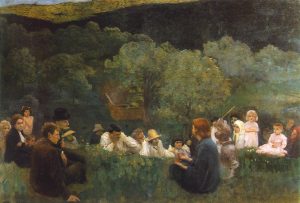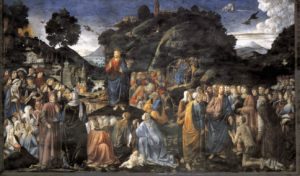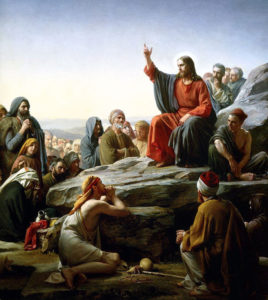Illuminations on the Lectionary readings for Feb. 5, 2023 (Epiphany 5A)
First Reading: Isaiah 58:1-12
Two important ideas run through Sunday’s Lectionary readings: righteousness and light. “Righteous,” in biblical understanding, may not mean quite what we think it does in modern times.

Sermon on the Mountain (1896), oil painting on canvas by Károly Ferenczy (1862-1917). Hungarian National Gallery, Budapest. (Click image to enlarge)
It speaks of God’s call to God’s people to practice justice, as Isaiah insists and as Jesus, too, asks of us; by going beyond mere fasting and ritual practice to stand against oppression, feed the hungry, house the homeless, clothe the naked. Righteousness will heal our souls and light up our lives, as the light of Epiphany that shines in the deep winter darkness will illuminate the way of our God.
Psalm: Psalm 112:1-9, [10]
Sunday’s Psalm portion, titled “Blessings of the Righteous,” echoes Isaiah’s call: The righteousness of those who follow God and delight in God’s commandments will endure forever. Those who are gracious and merciful, who deal with others generously and act with justice, the Psalmist sings, will “rise in the darkness as a light for the upright.” By living justly, we become an example for others and show the way to God.
Second Reading: 1 Corinthians 2:1-16
We continue our journey through the opening chapters of 1 Corinthians, listening in as Paul offers pastoral guidance for the quarreling community. He turns their thoughts toward humility, reiterating the advice that – even if following the crucified Jesus may make us appear foolish to the world – in fact we share God’s secret wisdom. The Holy Spirit gives us new life through Christ.
Gospel: Matthew 5:13-20
Sunday’s Gospel picks up in the middle of the Sermon on the Mount, just after Jesus has given the crowd the Beatitudes, promising God’s kingdom to the poor, the hungry, the thirsty; those who mourn, the meek; the humble, and all who are persecuted and oppressed. Now the crowd hears that, as God’s people, they are the salt of the earth and the light of the world. With that comes the responsibility to let the world see God through your good works. Jesus says he has not come to change God’s law that calls us to righteousness: Love God, and love our neighbors as ourselves. But in fulfilling the law, Jesus will show us new ways. We will hear more about that next Sunday in the next verses of the Sermon on the Mount, where Jesus counts the ways: “You have heard that it was said … but I tell you …” That which was old becomes new again in Jesus.



